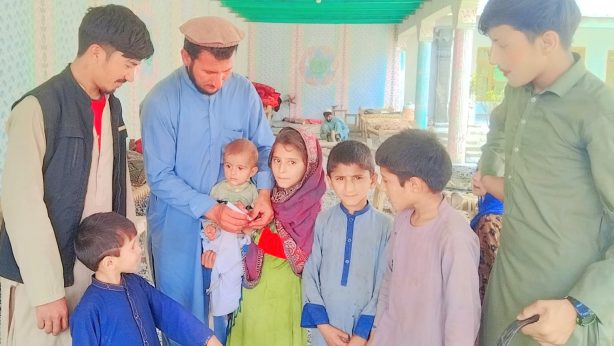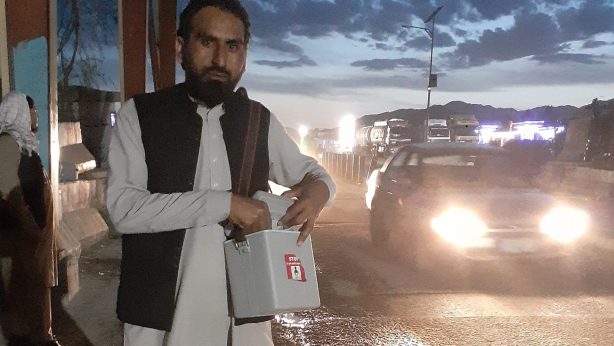The Decline of Negative Perceptions About Polio Vaccines: The Story of Noria and Gul Ahmad

Herat, Afghanistan – Noria, a 30-year-old mother, sits with her two daughters on her lap, laughing together. Her laughter reflects the joy and peace of mind she feels, knowing her children are healthy and protected from polio. Living in southern Herat, Noria now embraces a different view of the polio vaccine, though her journey to this understanding was not an easy one.
A few years ago, Noria and her husband, Gul Ahmad, were influenced by false beliefs and rumors, and they refused to vaccinate their children during three polio vaccination campaigns.
“My family elders always used to say that the polio vaccine came from the West and was harmful to us. My grandfather used to claim that this vaccine made the new generation sterile and weakened male strength,” Noria recalled.
She added that they wouldn’t allow the vaccinators near their home.
However, everything changed when her daughters contracted measles and influenza. Concerned, she took them to the doctor, who explained that the severity of their illness was largely due to their lack of vaccinations. These words had a profound impact on her. From that moment on, Noria resolved that her children would receive all vaccinations, including the polio vaccine, in every campaign to protect them from dangerous diseases.
Noria and her husband now realize that their previous decision was misguided and lacked any logical foundation.
 Noria, a 30-year-old mother, sits with her two daughters on her lap, laughing together. Her laughter reflects the joy and peace of mind she feels, knowing her children are healthy and protected from polio © Polio Free Afghanistan/ 2024/ Marzia Frotan
Noria, a 30-year-old mother, sits with her two daughters on her lap, laughing together. Her laughter reflects the joy and peace of mind she feels, knowing her children are healthy and protected from polio © Polio Free Afghanistan/ 2024/ Marzia Frotan
Polio Vaccination, the Only Way to Protect Children from Polio
Mawlawi Sultan Muhammad Alamyar, a religious scholar based in Herat, has played a vital role in raising awareness about the polio vaccine among families.
“From an Islamic perspective, it is obligatory to protect oneself from diseases. The polio vaccine is safe, and every family has a responsibility to vaccinate their children. The Prophet Muhammad taught that God has not created any disease without a cure, and the vaccine is an effective means of preventing polio,” he stated.
Mawlawi Alamyar emphasized that those who oppose the polio vaccine do not have correct knowledge about Islam.
He added that by not vaccinating their children, families are putting their children’s lives at risk, which is considered a grave sin.
Sohaila Karimi, an active vaccinator in Herat, also highlights the importance of raising awareness. She regularly encounters families bringing their children to hospitals for vaccinations.
“Public awareness has increased significantly compared to the past, and most families now understand the importance of vaccinating their children,” Karimi said.
She added that the continuous efforts of healthcare workers have heightened awareness in the community, and many families who previously opposed vaccination have now realized its value.
Mohammad Asif Kabir, the deputy director of public health in Herat, also noted the positive effects of awareness campaigns in the province.
“In previous years, there was significant opposition to the polio vaccine in villages and districts, but now, with increased awareness, this opposition has diminished,” he said.
However, he cautioned that some families still refuse to vaccinate their children due to persistent misconceptions, which is concerning.
Individuals like Noria and Gul Ahmad, who now regret their past decisions, exemplify positive change in society.
Noria actively encourages other families to ensure their children are vaccinated during every polio campaign to protect them from this dangerous disease.
She stated, “I am grateful that my daughters are safe from polio. I urge other families to learn from my mistake.”
By Marzia Frotan, Polio Free Afghanistan


